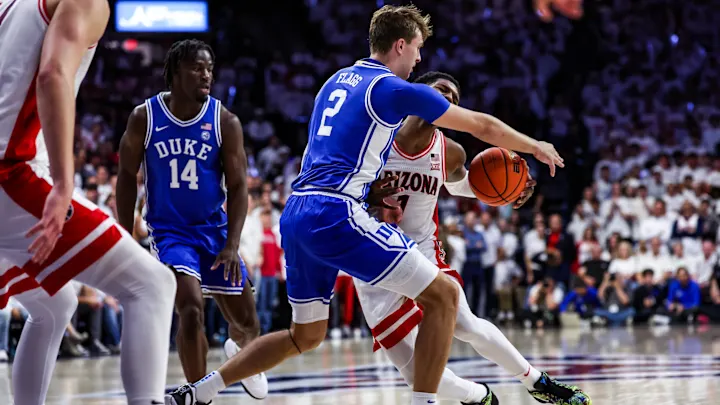As the NCAA Tournament reaches the Sweet 16, teams from all over the country are preparing for the ultimate test. One team that has attracted considerable attention is the Duke Blue Devils, under the leadership of first-year head coach Jon Scheyer. Duke, despite its perennial status as a college basketball powerhouse, faces an intriguing challenge as it squares off against the Arizona Wildcats in what promises to be an exciting and high-stakes contest.
While Duke boasts one of the most talented rosters in the country, a closer look at their path to the Sweet 16 raises a valid concern—was the team’s schedule in the Atlantic Coast Conference (ACC) too soft to fully prepare them for the intense competition they’ll face in the tournament? With some notable wins but also several close calls in a relatively weaker ACC, Duke may be at a disadvantage compared to other programs that faced more consistent top-tier competition. As the Blue Devils prepare to take on Arizona, a team that has been tested in a tough Pac-12 conference and throughout the non-conference schedule, this “soft schedule” could be a crucial factor in determining the outcome of the game.
Duke’s ACC Schedule: A Mixed Bag
Duke’s regular season schedule in the ACC was solid but lacked the elite competition that many other teams faced. The ACC, historically one of the most competitive conferences in college basketball, saw a down year in 2024. While there were still tough teams, such as North Carolina and Virginia, the overall depth of the conference seemed lacking compared to previous seasons. This left Duke facing an ACC that featured some inconsistent teams, rather than the dominant forces it had become accustomed to in past years.
- Top ACC Teams: Duke did face some challenging opponents in the ACC. Virginia, a perennial powerhouse under Tony Bennett, played solid defense and posed a challenge for the Blue Devils. Similarly, North Carolina, with its rich tradition and talent, was expected to be a tough matchup, though they didn’t perform up to their usual standard this season. Duke also had notable games against Miami, a team that has shown real growth and now boasts a dynamic offense. While Duke emerged with respectable results in these matchups, many of these games were not as demanding as those faced by some of their tournament peers.
- Inconsistent Competition: Outside of the top-tier teams in the ACC, Duke played against a range of programs that were either rebuilding or underperforming. Teams like Wake Forest, Boston College, and Georgia Tech were not on the same level as those in other power conferences like the Big Ten or Big 12. Even though these programs can pull off upsets on any given night, the overall consistency and elite-level talent were missing for much of the ACC slate. Consequently, Duke’s performance was often somewhat insulated by the lesser competition.
A Cautious Schedule: Too Few Tough Tests?
Duke’s schedule in the ACC, though not devoid of competition, was more manageable compared to what other NCAA Tournament hopefuls faced. One of the most glaring issues was the lack of non-conference games against elite teams. Historically, Duke has made a point to schedule tough matchups in the preseason, often facing top teams from power conferences and high-major programs. This type of scheduling is designed to challenge players, build depth, and prepare the team for March Madness.
However, Duke’s non-conference slate this season was not as rigorous as usual. The Blue Devils played a few teams with moderate talent but didn’t face the juggernauts of college basketball. This left the team with fewer opportunities to build resilience in hostile environments or against elite competition, something that could come back to haunt them in a matchup against a team like Arizona.
Arizona, on the other hand, faced several elite teams in the non-conference portion of their schedule, including matchups against top programs from the Big Ten, Big 12, and Pac-12. These games tested Arizona’s resolve early in the season and provided a litmus test for their tournament hopes. The Wildcats battled with top-tier talent, including facing teams that not only had significant size and skill but also offered physicality and depth that could rival the best teams in the nation. This type of preparation can make all the difference in a high-stakes March Madness game.
Duke’s ACC Schedule: The Impact on Tournament Readiness
The limited challenges faced by Duke in the ACC have raised questions about whether the team is truly battle-tested enough for March Madness, especially against the tough competition they’ll face in the Sweet 16 and beyond.
- Limited Exposure to Elite-Level Pressure: The ACC slate may have allowed Duke to rack up wins, but the lack of consistently facing top-ranked opponents means they might not have been exposed to the same level of tournament-like pressure. In March Madness, teams are expected to perform under immense pressure in front of thousands of screaming fans, and the ability to execute in those moments is critical. Duke, despite its obvious talent, may not have been sufficiently tested in those types of high-pressure scenarios during the regular season, especially in comparison to other teams with tougher schedules.
- Defensive and Offensive Adaptability: A major factor that Duke will need to confront against Arizona is the adaptability of both their offense and defense. Arizona is known for its fast-paced, high-scoring offense, which presents a dynamic challenge that Duke’s defense, despite its strengths, hasn’t faced too often in the ACC. While the Blue Devils played against teams that could score effectively—like Miami—the up-tempo, all-around offensive juggernaut that Arizona presents will push Duke’s defense to new limits. Duke will have to prove it can adjust to an offense with elite shooters, dominant big men, and a pace that forces teams to make quick decisions under pressure.
- Physicality and Matchups: The physicality of Arizona’s frontcourt, led by Azuolas Tubelis and Oumar Ballo, could be problematic for Duke. While Duke’s players like Dereck Lively and Kyle Filipowski are talented and tough, they haven’t faced many teams with the size and strength of Arizona’s bigs. The lack of consistently facing teams with elite frontcourts in the ACC could leave Duke at a disadvantage in this matchup. Arizona will likely look to exploit these mismatches, and Duke will need to rely on its defensive discipline and coaching adjustments to handle the physicality.
Can Jon Scheyer and Duke Adjust?
Jon Scheyer has already proven himself as a capable coach in his first season leading Duke, inheriting a team with big expectations after the departure of Coach K. He’s made adjustments to fit the modern era of college basketball, focusing on speed, ball movement, and versatile scoring. However, when it comes to March Madness, a coach’s ability to make quick, in-game adjustments becomes even more vital.
Scheyer’s challenge will be whether he can effectively prepare his team for the rigors of playing against a physically superior and tactically savvy team like Arizona. The Blue Devils will need to adjust quickly to the pace and intensity that Arizona brings to the table. Additionally, if the game turns into a fast-paced, high-scoring affair, Duke will need to rely on its youth and overall depth to keep up.
Arizona’s defense will also test Duke’s offensive execution. The Blue Devils will need to find ways to capitalize on Arizona’s defensive lapses while avoiding falling into a rhythm that plays into the Wildcats’ strengths. If Duke struggles to find consistent scoring, or if their defense becomes disorganized against Arizona’s fast breaks, it could be a long night for the Blue Devils.
Is Duke Ready for the Moment?
As Duke prepares for the Sweet 16 matchup against Arizona, the softness of their ACC schedule will undoubtedly play a role in how well they perform. While Duke is undoubtedly a talented team, its lack of consistent tests throughout the regular season may leave them vulnerable to the elite-level competition they’ll face in the tournament. Arizona, on the other hand, comes in battle-tested, having faced tough opponents both in conference play and during non-conference action.
Duke’s coaching staff, led by Jon Scheyer, will need to make critical adjustments to deal with Arizona’s strengths, including their fast pace and physical frontcourt. The Blue Devils will need to rely on their top players—Kyle Filipowski, Tyrese Proctor, Dereck Lively, and Jeremy Roach—to step up in the biggest moments. If Duke can find a way to match Arizona’s intensity and adjust to their style of play, they could advance to the Elite Eight. However, if the lack of tough competition throughout the regular season proves to be a glaring issue, it could mean a premature end to their tournament run.
Ultimately, this Sweet 16 matchup will serve as a true test of Duke’s readiness for the pressure and unpredictability of March Madness.



